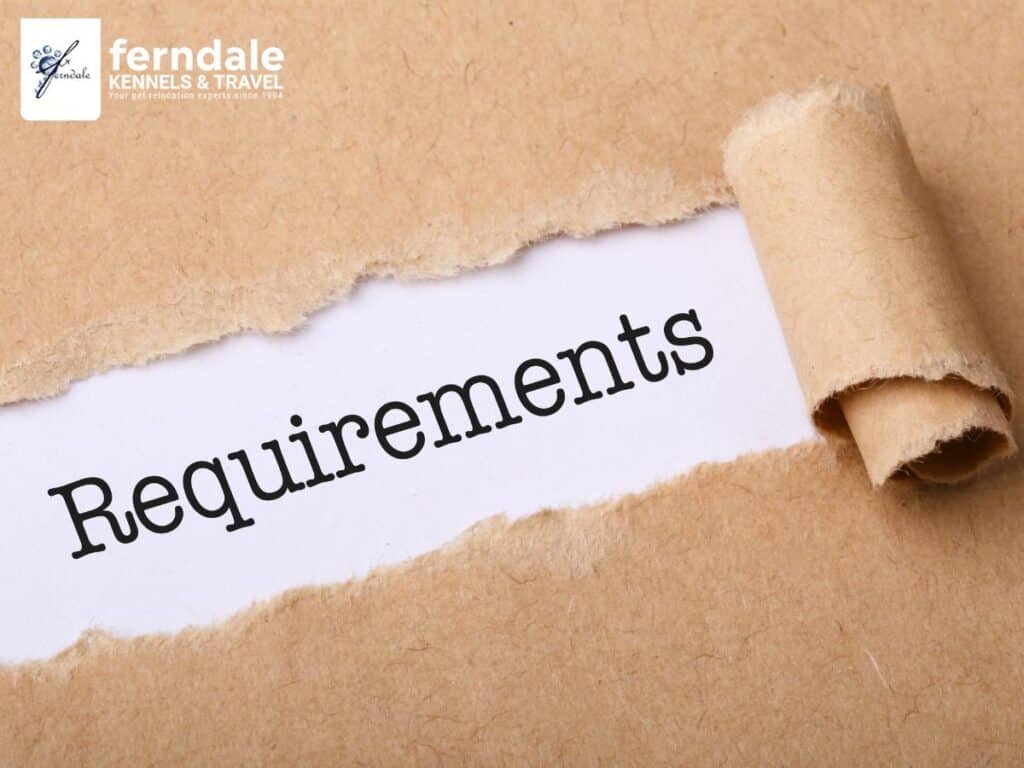Relocating to a new country is an exciting yet challenging task, especially when bringing your beloved pet along. For many pet owners, pets are cherished family members who provide companionship, emotional support, and joy. Therefore, ensuring their smooth and safe transition to a new environment is a top priority. Australia, with its strict biosecurity measures, poses unique challenges for pet importation, making it essential for pet owners to be well-informed about the pet relocation Australia process.
You might be wondering, “Can you bring pets to Australia?” Yes, you can, but there are strict regulations to follow. The process involves several steps, including obtaining an import permit, meeting specific health and vaccination requirements, and ensuring your pet undergoes a mandatory quarantine period upon arrival. Each step requires careful planning and adherence to detailed regulations to avoid complications.
Australia is renowned for its unique wildlife and pristine natural environment. To protect this biodiversity, the Australian government has implemented stringent biosecurity laws to prevent the introduction of diseases and problems that could harm the local ecosystem.
In this comprehensive guide, we will walk you through the entire process of bringing pets to Australia. Below we have covered detailed requirements for pet importation to Australia and the various challenges you may face. Our aim is to provide you with all the information you need to ensure a smooth and stress-free relocation for your furry friend. So, let’s dive in and explore everything you need to know about bringing pets to Australia.
Countries Categories
Group 1: New Zealand, Norfolk Island, and Cocos Island
Group 2: American Samoa, Bahrain, Barbados, Christmas Island, Cook Islands, Falkland Islands (Malvinas), Fiji, French Polynesia, Guam, Hawaii, Iceland, Japan, Kiribati, Mauritius, Micronesia, Nauru, New Caledonia, Niue, Palau, Papua New Guinea, Samoa, Singapore, Solomon Islands, Tonga, Tuvalu, Vanuatu, Wallis & Futuna
Group 3: Antigua & Barbuda, Argentina, Austria, Bahamas, Belgium, Bermuda, Brunei Darussalam, Bulgaria, Canada, Cayman Islands, Chile, Croatia, Cyprus, Czechia, Denmark, Estonia, Finland, France, Germany, Gibraltar, Greece, Greenland, Guernsey, Hong Kong, Hungary, Ireland, Isle of Man, Israel, Italy, Jamaica, Jersey, Kuwait, Latvia, Liechtenstein, Lithuania, Luxembourg, Macao, Malta, Monaco, Montenegro, Netherlands, Northern Mariana Islands, Norway, Poland, Portugal, Puerto Rico, Qatar, Reunion, Saint Kitts & Nevis, Saint Lucia, Saint Vincent & the Grenadines, Serbia, Seychelles, Slovakia, Slovenia, South Africa, South Korea, Spain (including Canary and Balearic Islands), Sweden, Switzerland, Taiwan, Trinidad & Tobago, United Arab Emirates, United Kingdom of Great Britain and Northern Ireland, United States of America (excluding Guam and Hawaii), Uruguay, Virgin Islands (British), and Virgin Islands (United States of America).
Non Approved counties:
Countries and territories not listed above are classified as non-approved countries due to their high incidence of rabies. Pet owners from non-approved countries can not bring their dogs and cats directly to Australia. Instead, these pets must first travel to a Group 2 or Group 3 country and reside there for at least 180 consecutive days before they can be eligible for entry into Australia. During their stay in the approved country, pets must undergo necessary testing, treatments, and examinations and comply with all Australian pet import requirements before they travel to Australia.
As of the latest guidelines, Australia categorizes the following countries as ‘Non-Approved’ for pet importation purposes: Afghanistan, Albania, Algeria, Angola, Armenia, Azerbaijan, Bahrain, Bangladesh, Belarus, Benin, Bhutan, Bolivia, Bosnia and Herzegovina, Botswana, Brazil, Brunei, Burkina Faso, Burundi, Cabo Verde, Cambodia, Cameroon, Central African Republic, Chad, China, Colombia, Comoros, Congo (Republic of the), Congo (Democratic Republic of the), Côte d’Ivoire, Cuba, Djibouti, Dominican Republic, Ecuador, Egypt, El Salvador, Equatorial Guinea, Eritrea, Eswatini (Swaziland), Ethiopia, Gabon, Gambia, Georgia, Ghana, Guatemala, Guinea, Guinea-Bissau, Guyana, Haiti, Honduras, India, Indonesia, Iran, Iraq, Jordan, Kazakhstan, Kenya, Korea (North), Kosovo, Kuwait, Kyrgyzstan, Laos, Lebanon, Lesotho, Liberia, Libya, Madagascar, Malawi, Maldives, Mali, Mauritania, Mauritius, Moldova, Mongolia, Montenegro, Morocco, Mozambique, Myanmar, Namibia, Nepal, Nicaragua, Niger, Nigeria, Oman, Pakistan, Palestinian Territories, Panama, Paraguay, Peru, Philippines, Qatar, Rwanda, Sao Tome and Principe, Saudi Arabia, Senegal, Serbia, Sierra Leone, Somalia, South Sudan, Sri Lanka, Sudan, Suriname, Syria, Tanzania, Thailand, Timor-Leste, Togo, Tunisia, Turkmenistan, Uganda, Ukraine, United Arab Emirates, Uzbekistan, Venezuela, Vietnam, Yemen, Zambia, and Zimbabwe.
Australian Pet Import Requirements
Pet Microchip
Dogs and cats being imported to Australia must have a microchip implanted before travel. The microchip must be an ISO-compliant 15-digit microchip and should be capable of being read by an Avid, Trovan, Destron, or any other ISO-compatible reader. It’s essential to note that the Australian Department of Agriculture, Fisheries and Forestry (DAFF) does not accept pets with microchip numbers starting with 999 or nine-digit microchips.
Pets Vaccinations
Before travelling to Australia, dogs and cats must be vaccinated against rabies and other common diseases. These vaccinations need to be valid for the entire quarantine period after entry.
For pets from Group 1 and 2 countries, which are rabies-free countries, rabies vaccination is not required. However, pets from Group 3 countries must receive a rabies vaccine after being microchipped. Additionally, dogs from these countries must be vaccinated against leptospirosis, distemper, hepatitis, parvovirus, and para-influenza. Dogs coming from Singapore must also be vaccinated against Canine Influenza Virus(CIV). Cats from Group 2 and 3 counties need to be vaccinated against feline enteritis, rhinotracheitis, and calicivirus.
Health Test (Dogs)
In addition to the previously mentioned vaccinations, dogs from Group 2 and 3 countries must be tested for certain canine diseases by a government-approved veterinarian.
Brucella canis (Brucellosis): Desexed dogs are exempt from Brucellosis testing. For dogs that are not desexed, a government-approved vet must scan and verify the dog’s microchip number before collecting a blood sample. The blood test can be a rapid slide agglutination test (RSAT), a tube agglutination test (TAT), or an indirect fluorescent antibody test (IFAT). This test must be conducted within 45 days before export and must show a negative result.
Leishmania infantum (Leishmaniosis): The veterinarian must scan and verify the dog’s microchip before drawing a blood sample for testing. The test for Leishmaniosis should be conducted using either an indirect fluorescent antibody test (IFAT) or an enzyme-linked immunosorbent assay (ELISA). The test must be performed within 45 days prior to travel and must return a negative result.
Leptospira canicola (Leptospirosis): Dogs that have not been vaccinated against Leptospirosis must undergo testing using a microscopic agglutination test (MAT). The veterinarian must scan the dog’s microchip before collecting the blood sample. The test should be conducted within 45 days before travel and must show a negative result at a serum dilution of 1:100.
Additional Treatment for Dogs and Cats
Internal and External Parasite Treatment
Both dogs and cats must undergo two internal parasite treatments, targeting nematodes and cestodes, 14 days apart. These treatments must be administered by a government-approved veterinarian within 45 days before importing the pet to Australia, with the second treatment given five days before travel.
Cats also need external parasite treatment for ticks and fleas using a topical product at least 21 days before travel. During vet visits, cats must be examined for external parasites, and the treatment should continue until export.
Dogs require external parasite treatment at least 30 days before the travel date and must be continuously treated for ticks and fleas by a certified veterinarian until departure.
Rabies Vaccination and RNATT
When traveling to Australia from a Group 3 country with your pet, there are specific requirements to ensure compliance with Australia’s biosecurity regulations. Here’s a summary of the steps you need to follow:
Rabies Vaccination: Your pet must receive an inactivated or recombinant rabies vaccine in an approved country when they are at least 84 days old. The vaccine must remain valid from the date of administration up to the date of export.
Rabies Neutralising Antibody Titer Test (RNATT):
- The RNAT test measures the effectiveness of the rabies vaccination.
- Blood for the test must be drawn 3-4 weeks after the rabies vaccination.
- A government-approved veterinarian must take the sample and scan and record the pet’s microchip number on the sample tube.
- The test must be conducted in an approved laboratory, and the result must be 0.5 IU/ml or higher. If the result is lower, the pet must be re-vaccinated and re-tested.
- The test results, which include the microchip number, sampling date and location, test type, and result, must be in English and signed by the issuing person.
- Make sure to travel to Australia before the test expires because the RNAT test result is valid for 12 months.
RNAT Test Declaration:
An official government veterinarian must check the RNAT test report and the rabies vaccination certificate, then complete, sign, and stamp the RNAT test declaration.
Mandatory Waiting Period:
There is a 180-day waiting period after the sample arrives at the lab before your pet can travel to Australia, provided the test result is satisfactory.
Veterinary Health Certificate
Pets travelling from Group 1 countries need a declaration that has the following pet information:
- Identifies that dogs and cats by breed, age, sex, and microchip number.
- Certifies that the pet is not a domestic/non-domestic hybrid and that the dog is not a prohibited breed.
- Confirms that if the pet is female, it is not more than 40 days pregnant or suckling young at the time of export.
- States whether the dog or cat has ever been to mainland Africa.
Pets require a health certificate completed by an official government veterinarian. The veterinary health certificate, found in Appendix 1 of the import permit, must accompany all pets travelling to Australia. This certificate must be signed and stamped on all pages by a certified vet, who will also provide a seal for the pet crate. The seal number must be recorded on the health certificate.
Pet Import Permit
Pet owners must apply for an import permit from the Australian Department of Agriculture, Fisheries and Forestry (DAFF). The application process includes submitting detailed information about the pet, including its health status, vaccinations, and microchip number. The import permit is essential for ensuring that all biosecurity requirements are met and that the pet’s entry into Australia is smooth and compliant with local laws.
Check Out: Cost of Bringing Pets to Australia
Navigating Pet Importation to Australia: Support from Hong Kong and Singapore Offices for All Asian Countries
If you are planning to move to Australia from Asia, we have offices in both Hong Kong and Singapore to assist with your pet transportation needs. Hong Kong is classified as a Group 3 country, meaning your pet will need to undergo the Rabies Neutralizing Antibody Titre Test (RNATT) before entering Australia. In contrast, Singapore is a Group 2 country, so this test is not required.
Additionally, through our Singapore office, we facilitate the transport of pets from various ‘Non-Approved’ countries in Asia, including Vietnam, India, Philippines, Cambodia, Thailand, Laos, China, Bangladesh, Bhutan, Brunei, Indonesia, Macau, Maldives, Myanmar, Nepal, Pakistan, and Sri Lanka. They enter, do the 1 month Singapore quarantine, then wait 5 months further before we fly them to Australia.
Our expertise ensures a smooth and compliant process for your pet’s relocation. We can do the same step through our Hong Kong office but given there is a long quarantine wait for Hong Kong over one year, we recommend to use th Singapore stepping stone as a faster process. For specific details, please contact our offices for expert guidance.
Conclusion
Bringing your pet to Australia involves navigating a complex process with stringent regulations. By understanding and adhering to these Australian pet import requirements, you can ensure a smooth transition for your furry friend. Proper planning, timely vaccinations, health tests, and obtaining the necessary permits are crucial steps to ensure your pet’s safe and stress-free relocation to Australia.
Moving with Your Pet to Australia?If you’re moving with your pet to Australia, Ferndale Kennels provides comprehensive door-to-door services to ensure a smooth and stress-free relocation for your furry friend. From handling import permits to arranging quarantine and transportation, Ferndale Kennels covers every aspect of the journey. Our experienced team will guide you through each step, ensuring compliance with all Australian regulations and making your pet’s transition as seamless as possible. For a hassle-free pet relocation experience, contact Ferndale Kennels, the best international pet relocation agency and let us take care of all the details, so you and your pet can enjoy a smooth transition to your new home in Australia. |
Frequently Asked Questions
Can I bring my pet to Australia?
Yes, you can bring your pet to Australia, but you must comply with strict biosecurity regulations, including obtaining an import permit, meeting health and vaccination requirements, and undergoing a mandatory quarantine period.
Can I bring pets from non-approved countries to Australia?
Pets from non-approved countries cannot be brought directly to Australia. They must first reside in a Group 2 or 3 country for at least 180 days, undergo necessary testing and treatments, and comply with all Australian import requirements before traveling to Australia.
How can I ensure a smooth relocation for my pet to Australia?
Proper planning, timely vaccinations, health tests, and obtaining the necessary permits are crucial. Working with experienced pet relocation services, like Ferndale Kennels, can help ensure compliance with all regulations and a smooth transition for your pet.
What is the cost of bringing pets to Australia?
The cost varies based on factors like the country of origin, specific health requirements, quarantine fees, and transportation costs. It is advisable to consult with a pet relocation agency for a detailed estimate. Contact Ferndale Kennels for expert assistance with your pet’s relocation.





